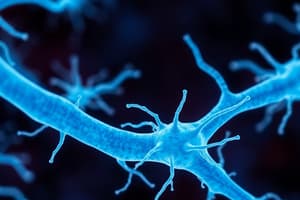Podcast
Questions and Answers
What is the primary role of sensory neurons?
What is the primary role of sensory neurons?
- Transmit signals from the CNS to muscles
- Connect sensory and motor neurons within the CNS
- Control involuntary actions
- Carry signals from sensory organs to the CNS (correct)
Which function of the nervous system processes sensory information and generates appropriate responses?
Which function of the nervous system processes sensory information and generates appropriate responses?
- Motor Function
- Autonomic Function
- Sensory Function
- Integrative Function (correct)
What initiates a reflex action?
What initiates a reflex action?
- Muscle fatigue
- A conscious decision
- A signal sent from the brain
- A stimulus detected by a sensory neuron (correct)
Which brain structure is primarily responsible for coordinating muscle movements and maintaining balance?
Which brain structure is primarily responsible for coordinating muscle movements and maintaining balance?
What can enhance brain health and support nerve function?
What can enhance brain health and support nerve function?
Which part of the nervous system controls involuntary actions such as heartbeat and digestion?
Which part of the nervous system controls involuntary actions such as heartbeat and digestion?
Flashcards are hidden until you start studying
Study Notes
Overview of the Nervous System
- The nervous system is responsible for controlling and coordinating all body activities.
- It is fundamental for responding to stimuli from the environment.
Main Parts of the Nervous System
-
Central Nervous System (CNS)
- Comprises the brain and spinal cord.
- Processes information and sends signals throughout the body.
-
Peripheral Nervous System (PNS)
- Consists of nerves outside the CNS.
- Connects the CNS to limbs and organs.
- Divided into:
- Somatic Nervous System: Controls voluntary movements.
- Autonomic Nervous System: Controls involuntary actions (e.g., heartbeat, digestion).
Functions of the Nervous System
- Sensory Function: Receives stimuli from the environment through sensory organs.
- Motor Function: Sends signals to muscles for movement.
- Integrative Function: Processes sensory information and generates appropriate responses.
Neurons
- Basic unit of the nervous system.
- Types of neurons:
- Sensory Neurons: Carry signals from sensory organs to the CNS.
- Motor Neurons: Transmit signals from the CNS to muscles.
- Interneurons: Connect sensory and motor neurons within the CNS.
Reflex Actions
- Automatic responses to stimuli.
- Involves a quick response pathway:
- Stimulus detected by sensory neuron.
- Signal sent to interneuron in the spinal cord.
- Interneuron relays signal to motor neuron.
- Motor neuron activates muscle for response.
The Brain
- Control center of the nervous system, responsible for processing and interpreting information.
- Divided into several parts:
- Cerebrum: Largest part, involved in thought, memory, and voluntary actions.
- Cerebellum: Coordinates muscle movements and maintains balance.
- Brainstem: Controls basic life functions like breathing and heart rate.
Maintaining a Healthy Nervous System
- Regular exercise enhances brain health.
- Proper nutrition supports nerve function.
- Adequate sleep is crucial for brain recovery and memory function.
Summary
- The nervous system is essential for interaction with the environment and body function.
- Understanding neurons, reflex actions, and brain functions helps grasp how we respond to the world around us.
Overview of the Nervous System
- The nervous system manages and coordinates all bodily activities, playing a crucial role in responding to environmental stimuli.
Main Parts of the Nervous System
- Central Nervous System (CNS): Consists of the brain and spinal cord, processing information and sending signals throughout the body.
- Peripheral Nervous System (PNS): Made up of nerves outside the CNS, connecting the CNS to limbs and organs.
- Somatic Nervous System: Controls voluntary movements.
- Autonomic Nervous System: Manages involuntary actions like digestion and heartbeat.
Functions of the Nervous System
- Sensory Function: Receives stimuli from the environment through sensory organs.
- Motor Function: Sends signals to muscles for movement.
- Integrative Function: Processes sensory information and generates appropriate responses.
Neurons
- The fundamental unit of the nervous system.
- Sensory Neurons: Carry signals from sensory organs to the CNS.
- Motor Neurons: Transmit signals from the CNS to muscles.
- Interneurons: Connect sensory and motor neurons within the CNS.
Reflex Actions
- Automatic responses to stimuli.
- Involves a quick response pathway:
- Stimulus detected by sensory neuron.
- Signal sent to interneuron in the spinal cord.
- Interneuron relays signal to motor neuron.
- Motor neuron activates muscle for response.
The Brain
- The control center of the nervous system, processing and interpreting information.
- Divided into several parts:
- Cerebrum: The largest part, involved in thought, memory, and voluntary actions.
- Cerebellum: Coordinates muscle movements and maintains balance.
- Brainstem: Controls basic life functions like breathing and heart rate.
Maintaining a Healthy Nervous System
- Regular exercise improves brain health.
- Proper nutrition supports nerve function.
- Adequate sleep is essential for brain recovery and memory function.
Studying That Suits You
Use AI to generate personalized quizzes and flashcards to suit your learning preferences.




